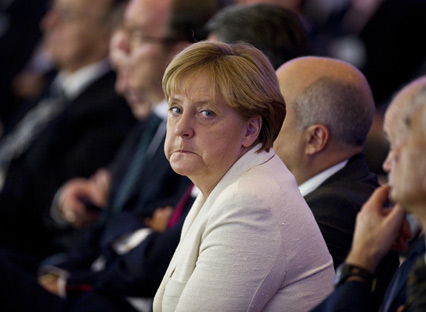The EU migration deal explained
Leaders agree plan for European-wide secure migrant processing facilities following ‘incredibly heated’ all-nighter

A free daily email with the biggest news stories of the day – and the best features from TheWeek.com
You are now subscribed
Your newsletter sign-up was successful
EU member states have put together a deal to address the migration crisis that Angela Merkel earlier this week warned “could end up determining Europe’s destiny”.
Following a gruelling nine hours of “often stormy” overnight talks in Brussels on Thursday, leaders agreed on a tentative plan of action that will create secure processing centres across Europe, Reuters reports.
Would-be asylum seekers whose claims are rejected will be deported, while those accepted as genuine refugees will be resettled by EU states on a voluntary basis.
The Week
Escape your echo chamber. Get the facts behind the news, plus analysis from multiple perspectives.

Sign up for The Week's Free Newsletters
From our morning news briefing to a weekly Good News Newsletter, get the best of The Week delivered directly to your inbox.
From our morning news briefing to a weekly Good News Newsletter, get the best of The Week delivered directly to your inbox.
Other agreements reached at Thursday’s summit include a deal on shared responsibility for migrants rescued at sea, another of Italy’s key demands.
Countries that function as key transit points on human smuggling routes into Europe, such as Turkey and Morocco, will also receive extra funding to strengthen their borders.
Many of the finer details of the deal, such as where the processing centres will be located or how countries will share the burden of resettlement, remain vague.
But even a vague agreement is a better-than-expected outcome for a summit that European Council President Donald Tusk himself admitted was “incredibly heated”.
A free daily email with the biggest news stories of the day – and the best features from TheWeek.com
“Diplomats described a tense, tortured meeting with small groups of leaders huddled together in a desperate bid to break the deadlock,” HuffPost reports.
Although the number of migrants seeking refuge in Europe has slowed dramatically since peaking in 2015, the issue remains deeply divisive.
The influx of migrants has exposed economic, social and political tensions that run deeper than the current crisis, says the BBC’s Katya Adler.
Northern European nations suspect their poorer neighbours to the south and east of turning a blind eye to migrants passing through en route to wealthier countries, while “Italy and Greece smoulder with resentment at having been left alone to deal with migrant arrivals”.
Italy’s new prime minister, Giuseppe Conte, has said that calls for migrants to be processed in the first EU country that they arrive in put an unfair burden on his nation. Prior to the summit, he vowed to veto any prospective deal that did not alleviate Italy’s burden.
However, proposals to distribute asylum seekers proportionally among member states have been met with point-blank refusal by nationalist governments in central and eastern Europe.
Emerging from the talks at 5am local time, Merkel - who has faced intense pressure at home to take a harder line on migration - sought to assure reporters that the tentative deal was a “good signal” of cooperation among member states.
EU leaders now have “a lot of work to do to bridge the different views”, she acknowledged.
-
 6 of the world’s most accessible destinations
6 of the world’s most accessible destinationsThe Week Recommends Experience all of Berlin, Singapore and Sydney
-
 How the FCC’s ‘equal time’ rule works
How the FCC’s ‘equal time’ rule worksIn the Spotlight The law is at the heart of the Colbert-CBS conflict
-
 What is the endgame in the DHS shutdown?
What is the endgame in the DHS shutdown?Today’s Big Question Democrats want to rein in ICE’s immigration crackdown
-
 Switzerland could vote to cap its population
Switzerland could vote to cap its populationUnder the Radar Swiss People’s Party proposes referendum on radical anti-immigration measure to limit residents to 10 million
-
 Epstein files topple law CEO, roil UK government
Epstein files topple law CEO, roil UK governmentSpeed Read Peter Mandelson, Britain’s former ambassador to the US, is caught up in the scandal
-
 Iran and US prepare to meet after skirmishes
Iran and US prepare to meet after skirmishesSpeed Read The incident comes amid heightened tensions in the Middle East
-
 Grok in the crosshairs as EU launches deepfake porn probe
Grok in the crosshairs as EU launches deepfake porn probeIN THE SPOTLIGHT The European Union has officially begun investigating Elon Musk’s proprietary AI, as regulators zero in on Grok’s porn problem and its impact continent-wide
-
 Israel retrieves final hostage’s body from Gaza
Israel retrieves final hostage’s body from GazaSpeed Read The 24-year-old police officer was killed during the initial Hamas attack
-
 China’s Xi targets top general in growing purge
China’s Xi targets top general in growing purgeSpeed Read Zhang Youxia is being investigated over ‘grave violations’ of the law
-
 Panama and Canada are negotiating over a crucial copper mine
Panama and Canada are negotiating over a crucial copper mineIn the Spotlight Panama is set to make a final decision on the mine this summer
-
 Europe moves troops to Greenland as Trump fixates
Europe moves troops to Greenland as Trump fixatesSpeed Read Foreign ministers of Greenland and Denmark met at the White House yesterday